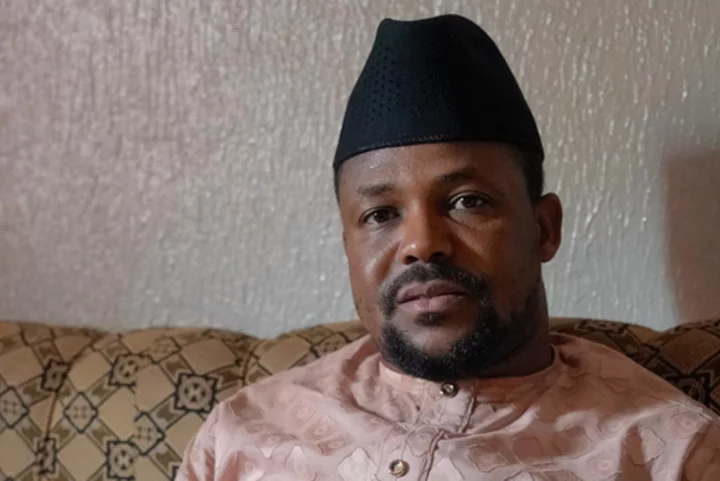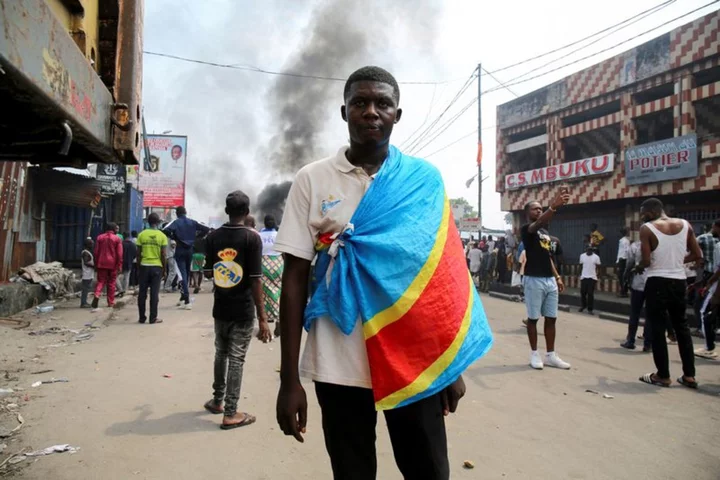NIAMEY, Niger (AP) — The only way to avoid conflict between mutinous soldiers that ousted the president in Niger and regional countries threatening an invasion to reinstate him is to recognize the new regime, a rights defender with ties to the junta told The Associated Press.
In his first interview with Western media Friday, Insa Garba Saidou, a local activist who supports Niger’s new military rulers in its communications and says he is in direct contact with them, said there will be no dialogue with regional countries until they acknowledge the new head of state.
Nearly three weeks ago mutinous soldiers led by the head of the presidential guard, Gen. Abdourahmane Tchiani, overthrew the West African country's democratically elected president, claiming they could do a better job of securing the nation from growing jihadi violence linked to al-Qaida and the Islamic State group. Tchiani was declared in charge of the country.
The West African regional bloc, ECOWAS, has threatened to use military force if President Mohamed Bazoum, who took office two years ago, is not released and reinstated. However, the junta has dismissed its warnings and refused most attempts at dialogue.
“There is only one option, accepting the regime or war,” said Saidou. “It is finished for Bazoum, you must forget about him. It is finished, it is a waste of time trying to restore him. It is not possible,” he said.
On Thursday, ECOWAS said it had directed the deployment of a “standby force” to restore democracy in Niger after its deadline Sunday to reinstate Bazoum expired. It's unclear when, or where the force will be deployed, but analysts say it could include up to 5,000 troops from countries including Nigeria, Benin, Ivory Coast and Senegal.
While the bloc says it wants mediation to prevail, multiple attempts by ECOWAS, as well as others, have yielded little.
Last week a proposed visit by ECOWAS, the United Nations and the African Union was rejected citing "evident reasons of security in this atmosphere of menace” against Niger. A day prior, top U.S. diplomat, Under Secretary of State Victoria Nuland, met some members of the junta but was unable to speak with Tchiani or see Bazoum. Representatives of the junta told her during the visit that Bazoum would be killed if ECOWAS invaded Niger, according to two Western military officials who spoke to the AP on condition of anonymity because of the sensitivity of the situation.
Many Western nations saw Niger as one of the last democratic countries in the Sahel region, the vast expanse south of the Sahara Desert, that they could partner with to beat back the growing jihadi threat. Hundreds of millions of dollars have been poured into providing equipment and training for Niger's military by specialized French and U.S. forces, all of which could now be used by the junta to tighten its grip on power.
The military regime is already entrenching itself, appointing a new government and stoking anti-French sentiment toward its former colonial ruler, to shore up its support.
On Friday, hundreds of people protested outside the French military base in the capital, Niamey, chanting “down with France” and waving Russian flags.
Mercenaries from the Russian-linked Wagner group, already operate in a handful of other African countries and are accused of committing human rights abuses. Earlier this month during a trip to neighboring Mali, which is also run by a military regime and cooperates with Wagner, the junta reportedly asked the mercenaries for help.
“We don’t agree with France. We want France to leave our country and go to their country. This is Niger, not France," said Souleymane Djibo a demonstrator.
Days after ECOWAS' order for the standby force to deploy, it's still unclear what that entails or if they'll invade. The African Union Peace and Security Council could overrule the decision if it felt that wider peace and security on the continent was threatened by an intervention, say analysts. The African Union is expected to meet Monday to discuss Niger's crisis.
Some Sahel experts say the insistence on force is a cover to spare ECOWAS from the embarrassment of having made a threat with no real capacity or notion of how to execute it. “The bloc is acting like a poker player who tried (to) bluff and, when called on it, raised the stakes to buy time. In both card games and in geopolitics, when one tries to bluff, one is rarely so lucky as to have an opponent fooled into folding,” said Peter Pham, former U.S. special envoy for West Africa’s Sahel region and a distinguished fellow at the Atlantic Council.
Still, if fighting does ensue the most battle-experienced and best-equipped militaries in West Africa, either belong to Niger, or are sympathetic to it, such as Mali and Burkina Faso. Both countries have opposed the intervention and sent delegations to Niger to discuss joint defense efforts.
Saidou, the activist who supports the junta, said no matter how ECOWAS plans to invade, be it by land through neighboring Benin or Nigeria or by air, any attack on the palace will result in Bazoum's death. While he didn't confirm a deliberate plan to murder the now-ousted president, he said that if an invasion began soldiers would kill him, he said. “There is no one among the soldiers still loyal to Bazoum."
He dismissed reports that Bazoum's conditions under house arrest in his presidential compound were dire and said he had access to medical care if needed and still had his phone, a sign that no one wanted to harm him. He did not say how he had knowledge of the president’s condition. Saidou said he was being kept for his own security and the only way for Bazoum to be released was for ECOWAS to accept that his time in office was finished.
Those close to the president, however, paint a much starker picture.
Since the July 26 coup, Bazoum's been confined with his wife and son to the basement of his presidential compound, which is surrounded by guards and is now cut off from resupplies of food, electricity, water and cooking gas. Niger's ambassador to the United States, Mamadou Kiari Liman-Tinguiri, told the AP that the junta is trying to starve him to death.
On Friday, United Nations human rights chief Volker Turk said he was extremely concerned about Bazoum's rapidly deteriorating condition, calling the family's treatment “inhuman and degrading” and in violation of international human rights law.
————
Associated Press reporter Jamey Keaton in Geneva, Switzerland contributed









